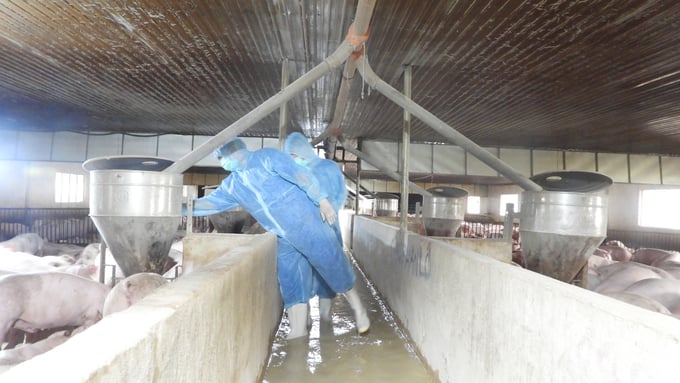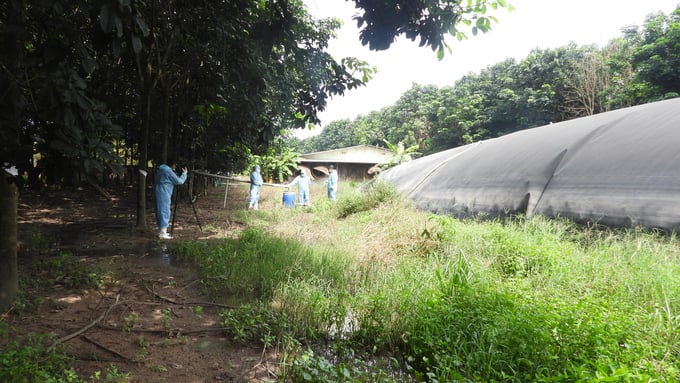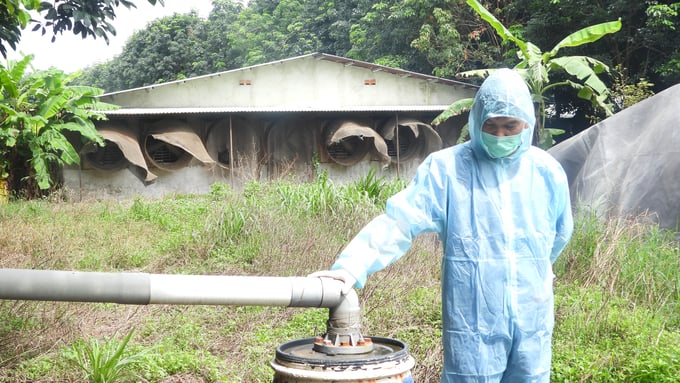November 19, 2025 | 02:14 GMT +7
November 19, 2025 | 02:14 GMT +7
Hotline: 0913.378.918
November 19, 2025 | 02:14 GMT +7
Hotline: 0913.378.918

The closed-process high-tech pig farm is owned by Mr. Nguyen Thanh Vien. Photo: Tran Trung.
We traveled over 10 kilometers on a red dirt road, weaving through rubber plantations, and finally arrived at the "business domain" of Mr. Nguyen Thanh Vien, the owner of a pig farming facility subcontracted by C.P. Vietnam Livestock Joint Stock Company - Binh Phuoc Branch, located in Hamlet 5, Minh Lap Commune, Chon Thanh Town.
We couldn't help but be surprised as this pig farming facility is quite large in scale, yet it operates as a closed-loop system following the process of anaerobic digestion of livestock waste to produce electricity for both production and daily activities across the entire facility, supporting over 2,000 finishing pigs. Remarkably, there is no foul odor present.
Standing beside the extensive biogas chamber system, alongside a modern gas pipeline system that is channeling individual streams of biogas into a power generator for the entire facility, Mr. Vien shared: Initially, he operated a small-scale manual pig farming operation. In 2016, fate brought him into contact with C.P. Vietnam Livestock Joint Stock Company - Binh Phuoc Branch, which offered a contract farming arrangement. Encouraged by this opportunity, he courageously invested in expanding his farming facility.

With the extensive biogas chamber system on the pig farm, Mr. Vien has achieved a level of energy self-sufficiency on a monthly basis, saving hundreds of millions of VND. Photo: Tran Trung.
However, the issue of electricity shortage for production remains a constant concern for high-tech and closed-loop livestock farms, especially when the power supply is disrupted. During power outages, the ventilation, cooling, automatic feeding, and drinking systems all come to a halt, significantly impacting the growth process and even leading to pig mortality. Additionally, the waste treatment technology at that time was outdated, causing severe environmental consequences.
After thorough research, Mr. Vien made a resolute decision to invest nearly half a billion VND to reinstall the waste treatment system for pig farming and optimize biogas production. He dug larger and deeper pits, simultaneously investing in a biogas-powered electricity generator and rebuilding the waste collection system. Moreover, he expanded the gas collection system.

Modern gas pipeline system, with no waste emissions to the environment. Photo: Tran Trung.
Since the installation of the biogas-powered electricity generator, Mr. Vien has efficiently utilized all the gas produced during the waste treatment process from pig farming. With this electricity system, he has reinstalled lighting and heating for the pigs. Additionally, he uses the system to provide lighting for the farm. Thanks to this biogas-powered electricity system, his family saves nearly 100 million VND in electricity costs each month.
"What pleases me the most about this biogas-powered electricity generator system is that it helps protect the environment. We no longer release excess biogas and minimize the use of the national power grid, especially considering the grid is often overloaded and electricity is scarce to meet the current demand of the people", Mr. Vien stated.
According to calculations by livestock farmers, a farm raising 100 pigs consumes at least 100 kWh of electricity per day and night. By using a biogas-powered electricity generator, the cost for electricity is significantly reduced.

Environmental benefits and energy costs make the use of biogas generators on the farm an attractive option for Binh Phuoc pig farmers. Photo: Tran Trung.
Mr. Tran Van Phuong, Deputy Director of the Department of Agriculture and Rural Development in Binh Phuoc province, stated that since 2008, the province has been planning the development of livestock farming towards industrialization and modernization, aiming to create safe livestock product chains and gradually reduce small-scale livestock farming.
At the moment, the total pig population in the locality is around 2 million, of which 80% are on large-scale farms and 66% are on high-tech farms. All farms must undergo environmental impact assessments and ensure the presence of biogas digesters for wastewater treatment before obtaining livestock farming permits. However, the utilization of biogas as a source of electricity generation is relatively new.
"In some remote and distant areas of the province, the electricity supply is still weak and inadequate. Therefore, the proactive use of biogas to run electricity generators on farms helps secure the power source for livestock farming, reduces production costs, ensures the environment, and minimizes risks. Currently, the local livestock industry is encouraging large-scale farm owners and livestock households to adopt this technology, contributing to the sustainable development of the livestock sector", emphasized Mr. Tran Van Phuong.
Translated by Nguyen Hai Long

(VAN) Integrating agricultural extension activities with ecotourism development unlocks promising new avenues for localities boasting specific advantages in grape and apple cultivation.

(VAN) Enterprises and cooperatives accompany farmers in Tay Ninh to develop an organic seedless lime growing area, paving the way for poverty reduction.

(VAN) There were times when Pho faltered, yet his aspiration to bring the pure aroma to those who truly value clean tea kept urging him forward.

(VAN) Bich Thao Coffee Cooperative pioneered products achieving the national 5-star OCOP standard, paving the way for Son La coffee to conquer international markets.

(VAN) The Bao La bamboo-and-rattan cooperative has been producing goods integrated into value chains. As a result, its products have reached global markets.

(VAN) The training course in An Giang equips learners with emission verification methods, thus creating a basis for low-emission rice production.

(VAN) Thu Lum commune is focusing on developing medicinal plants under the forest canopy, creating sustainable livelihoods for local people, and contributing to protecting the ecological environment.